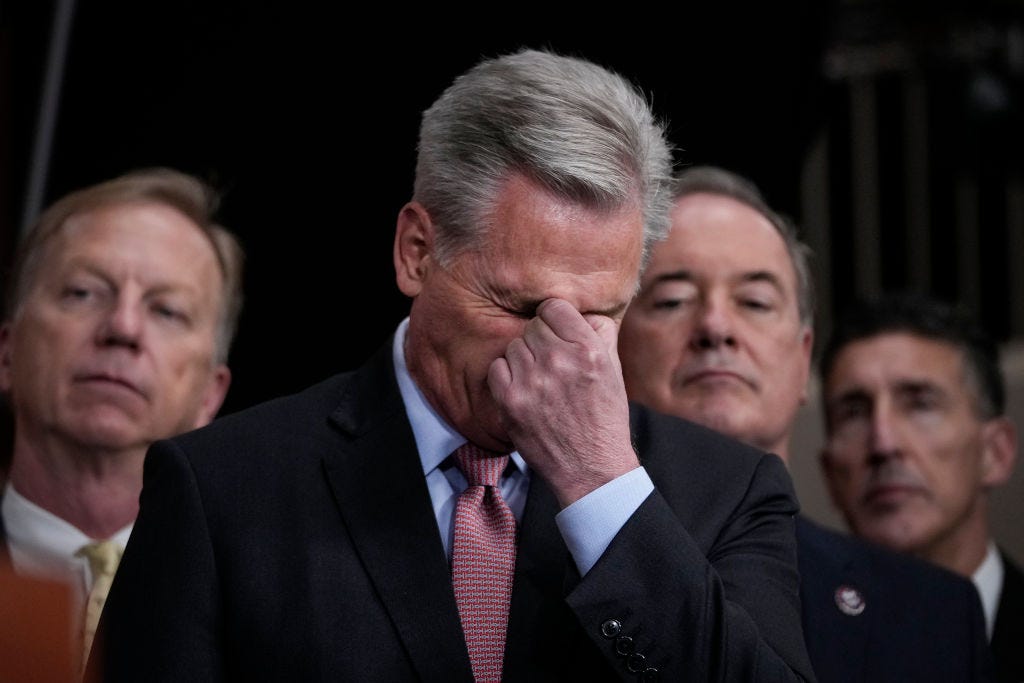Minority Report
A chaotic US Congress faces a multi-front war.
“I know not with what weapons World War III will be fought, but World War IV will be fought with sticks and stones.” – Albert Einstein
The 118th US Congress features one of the slimmest house majorities in history. The two major parties split the 2022 election by a count of 222-213, with Republicans holding the razor-thin edge. Unless the majority party can exhibit absolute discipline in voting as a unified block, governing in such situations can be challenging, as former House Speaker Kevin McCarthy found out when he initially stood for election to that powerful position. At that time, a small group of fiscal conservatives within his caucus withheld support, kicking off days of horse trading and an unprecedented 15 rounds of voting.
As the debates dragged on, McCarthy was paid a visit by outgoing Speaker Nancy Pelosi, the wily Democrat from California. Among the contentious issues was whether a single representative could force a vote to remove the speaker, something Pelosi was wise enough to strike from the rules during her similarly thin majority in the prior Congress. The holdouts wanted McCarthy on a short leash, and he was understandably loath to concede. Pelosi advised him to give in to that demand, assuring that in the unlikely event such a proposal made it to the floor, she would protect the integrity of the House by harnessing enough Democrats to help beat back the rebellion. With few options beyond trusting Pelosi’s word, McCarthy gave in to the conservatives and became Speaker.
We learned of this fascinating bit of closed-door maneuvering during McCarthy’s remarkable press conference held moments after he was ousted from the position last week. A single conservative member had indeed brought a motion to remove him, and when it came time to vote, every Democrat voted against McCarthy. Despite winning 96% support from within his conference, eight conservatives ended his speakership, sending Congress into chaos. Interim House Speaker and close McCarthy ally Patrick McHenry vented his frustration at Pelosi’s betrayal by ordering her to vacate her workspace in the Capitol immediately, ending a territorial concession granted out of respect for her former speakership.
Whether McCarthy was wise to trust Pelosi’s word is now moot, but one wonders if she might come to regret hanging her successor out to dry. After successfully pushing to drop additional funding for Ukraine from the latest stop-gap government funding bill, House conservatives drove McCarthy from office over their fear that he had cut a side deal with Biden on the topic, something the President appeared to have inadvertently made public (emphasis added throughout):
“Contradictory signals from the White House about a potential deal on Ukraine funding between President Joe Biden and House Speaker Kevin McCarthy have sowed confusion in Washington as lawmakers seek consensus on a new aid package for Kyiv. Biden's comment on Sunday that he ‘just made’ a deal with McCarthy on providing Kyiv with more security assistance left lawmakers guessing and the White House scrambling to explain exactly what the president meant…
But in attempting to walk back Biden's statement, the White House appeared to embolden conservative House Republicans who oppose providing Ukraine with more military assistance.”
That the war in Ukraine is not going particularly well, and conservative opposition to sending good money after bad is growing, are rather inconvenient developments for the Biden administration heading into an election year. Stack this with the intensity of events in the Middle East, and the Democrats might soon wish they had McCarthy back across the table—surely a more malleable adversary than his successor will prove to be. The brutal and unconscionable assault by Hamas on thousands of Israeli citizens, and the declaration of war that swiftly followed, look set to throw the entire region into its most dangerous period of conflict in 50 years. Critically, it also forces to the fore difficult questions on the future of Ukraine just as Republicans in the House are fixing for a fight.
As funding for Ukraine runs dry and weapons inventory shrinks, the pressure on the situation has never been higher. Will US political upheavals and the newfound need to direct resources to Israel crowd out Ukraine? Will Putin seize the opportunity presented by a two-front war? What are the potential impacts on the energy markets if he does? Let’s look past the immediate headlines and assess how things might play out in the weeks ahead.



